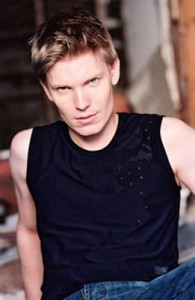
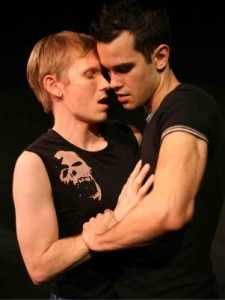
Hunter Lee Hughes and (r.) opposite Gavyn Michaels in The Sermsons Of John Bradley
Hunter Lee Hughes’ first acting role was as 12-year old geek Doc in the kiddie horror flick Haunted Spring, shot in Houston, his hometown. Since moving to Los Angeles, he has appeared in indie projects, most recently opposite Tony-award winner Elizabeth Ashley in Jimmy Palmieri’s Tweakers.
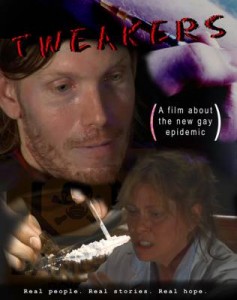
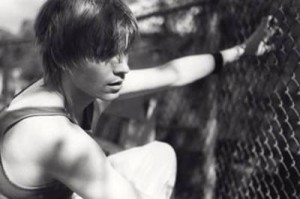
Hunter in Tweakers (l.) and A Prayer For My Daughter (r.)
Hunter’s Los Angeles theatre credits include his critically acclaimed role as punk Jimmy in A Prayer for My Daughter, directed by two-time Emmy award winner Dorothy Lyman.
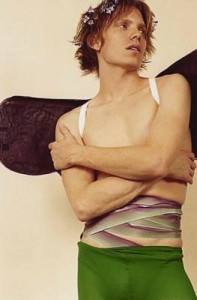
Hunter in Fate Of The Monarchs (Photo: Ken Gonzales-Day)
He also wrote and performed the original one-man show Fate Of The Monarchs, which premiered at Highways Performance Space, then ran at NoHo Arts Center.
Hunter’s latest stage project, The Sermons Of John Bradley, premieres at the Lex Theatre in Hollywood on January 9th. Written by Hunter and directed by Marisa Marco, Sermons is the story of a man whom nobody particularly cared about or listened to … that is, until shocking, naughty pictures of his father, Reverend Matthew Bradley, showed up on the Internet and destroyed the Reverend’s spotless reputation. When his family anoints John to sway the furious churchgoers towards forgiveness, the young man discovers a voice with the ability to persuade, manipulate, and win.
Hunter graciously took time from his busy rehearsal schedule to chat with StageSceneLA about his career, his life as an out gay actor, and the new project which is so dear to his heart.
So Hunter, how did a Houston born and bred actor end up in Los Angeles rather than New York or somewhere on the East Coast?
I knew I wanted to pursue acting and intuitively felt more comfortable with LA than New York.
Why is that?
Houston’s more like Los Angeles than New York.
In what ways?
L.A. and Houston both have neighborhoods connected by freeways, lots of traffic, big personalities, and both cities are more kooky than intellectual, which I like.
You’ve appeared in numerous productions written by other playwrights. What prompted you to write The Sermons Of John Bradley as a vehicle for yourself to perform?
I went through a period of grieving some pretty big losses and mounting a show seemed a lot cheaper than therapy and hopefully more fun too. John Bradley starts the show by learning that his family isn’t what he thought it was—his supposedly pristine preacher father is actually a kinky philanderer. I felt like a lot of things about my life weren’t fulfilling my expectations of what they “should” be and I guess this play was a way to explore that.
How does performing your own words differ from acting a part written by someone else?
Once I started exploring Sermons as an actor, I approached it just like I’d approach any other part with the side benefit that if I discover a line that really doesn’t make any sense, I have the power to change it. You have to use that power sparingly, though, because the temptation is to solve everything with re-writing when sometimes the problem is that I’ve missed something as an actor.
You’ve previously written and performed a one-man show, Fate Of The Monarchs. I notice that The Sermons Of John Bradley features two other actors, yet is made up of a series of “sermons” delivered by your character, John Bradley. How would you describe this new work? Is it a three-character play in the traditional sense?
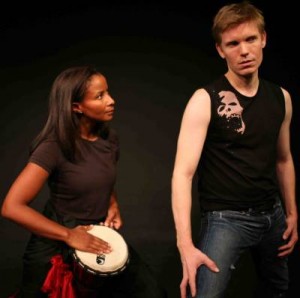
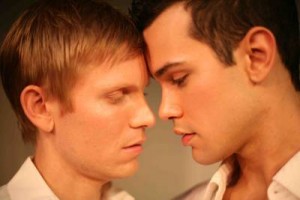
Hunter with Sermon costars Mary T. Sala and Gavyn Michaels
It’s a hybrid. It isn’t a pure one-man show at all because Trevor (Gavyn Michaels*) and the Shaman (Mary T. Sala) are essential to the story and have fully developed characters that speak and challenge John. Plus, the sermons are not literal sermons. One is a debate on gay marriage, another is a crystal meth survivors’ meeting and we even have a performance art piece. All the scenes take place in public, but within that general form, lots can happen and does. In fact, part of John’s modus operandi is to use public forums to manipulate his relationships. Hopefully it’s fun for the audience to see him doing that. I don’t know that I’ll ever do a pure one-man show again. There’s nothing harder from an acting point of view, in my opinion.
When you do a self-written piece like The Sermons Of John Bradley, how much does working with your director shape the final result, and in what ways?
Marisa creates a lush visual impact for the show. As a writer-performer, you can never really see the stage pictures and visuals. You have to trust that to someone else. I’m lucky because Marisa gets it at a gut level–the unflinching darkness contrasted with the whimsical romanticism. She helps crystallize what’s going on in the writing, acting and design elements, and her satirical wit helps the show to sizzle more than it did before we recruited her.
You recently workshopped Sermons. What did you learn from that experience?
I really learned to trust the process, that somehow you get exactly what you need to create. The piece needed a producer and I found Elizabeth (Gordon) with almost no effort. We hired Mary and Gavyn without even an audition and they are terrific. When we needed a choreographer, I called up Ashley Osler, who once taught me some pole-dancing moves and she said, “Yes.” One theatre didn’t work out in terms of a rental and we ended up finding the Momentum, which suited our show perfectly. I’ve learned to sort of allow different elements to come into the process while still feeling as if I’m driving ahead full-steam. It honestly amazes me that all these people are willing to help bring this piece to life and I’m very grateful. So I guess you could say the workshop taught me just how generous and supportive others have been of the piece.
Based on what I’ve read about The Sermons Of John Bradley, I’m assuming that you’re out professionally. How difficult was it for you to make a decision that far too many actors still fear making?
It’s really a practical decision to be honest because I just don’t have the energy to maintain a double life and still be effective in my creativity. Plus, having an alternative sexuality is something that’s been difficult at times and I’ve needed to explore it creatively in order to make peace with it.
Have there been any rewards in being open about yourself in your career?
No one gives you a medal or anything for being open about yourself. If they start handing out medals for it, please let me know.
John Bradley is the son of a Texas preacher. Anything autobiographical here?
Well, my own father is actually really cool with the gays, although there were a few iffy years back there in the past. I feel I need to say that because so many people assume a lot about my father after seeing the piece because they want to believe it’s all autobiographical. Of course, it is autobiographical in many ways, but it’s not literal. So my father in the piece sometimes stands in for people other than my real father and the situations aren’t literal situations that happened to me either. But there’s a psychological similarity to the journeys of John Bradley and Hunter Lee Hughes.
Why do you think the Southern Baptists, to name just one denomination, remain so stubbornly resistant to accepting and welcoming gays and lesbians into their folds?
It’s really sad that some religious groups have such a tough time welcoming gays. I’m not sure I know the answer as to why that is. I think it’s a lot about sex, if I had to guess. Gay people are sort of known for having a lot of hot sex and maybe that scares some people and makes others jealous, I don’t know.
One of John Bradley’s sermons is from a debate on gay marriage between Trinity and Baylor Universities . How have you reacted to the Yes On 8 victory?
I think it’s sad that so much time, money and energy was spent to try and deprive one group of people the highest expression of their love.
How do you see the future of gay marriage over the next five to ten years?
I hope it comes through, but even more important is for us to support each other in pursuing and maintaining meaningful love relationships, whether society recognizes them or not.
Who are you hoping to reach with this production?
It’s a story about a guy who’s overshadowed by his father and then his lover, who uses performing as a way to find his voice, win relationships and succeed. So, I’m hoping to reach anyone who can relate to that journey.
What do you hope people will take home from it?
I hope it moves people, but I’ll be happy if they go home feeling like they saw a good story, met dynamic characters, and are left with a couple unshakable moments.
As an L.A. based actor, are you also pursuing film and TV work?
I’ve always had a more masculine creative energy, which I think is right for film and for theatre. I love to go project by project, build something, then tear it down and move on. I’ve always thought television is a more feminine medium about nurturing the same characters with the same audience week after week, which is great but just not as much a match for my energy. On the other hand, I’m very interested in making movies. For the last three years, I’ve served as the writing assistant to screenwriter Mardik Martin, who co-wrote Raging Bull and Mean Streets. He taught me most of what I know about visual storytelling. I’ve written a screenplay version of Fate of the Monarchs, which is a high priority for me, as well as a new screenplay with Marisa called The Berkeley’s. My goal for 2009 is to get one of these two films into production.
Thanks, Hunter. I can’t wait to see The Sermons Of John Bradley.
http://www.SermonsofJohnBradley.com


 Since 2007, Steven Stanley's StageSceneLA.com has spotlighted the best in Southern California theater via reviews, interviews, and its annual StageSceneLA Scenies.
Since 2007, Steven Stanley's StageSceneLA.com has spotlighted the best in Southern California theater via reviews, interviews, and its annual StageSceneLA Scenies.







 COPYRIGHT 2024 STEVEN STANLEY :: DESIGN BY
COPYRIGHT 2024 STEVEN STANLEY :: DESIGN BY